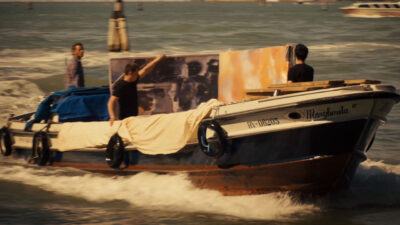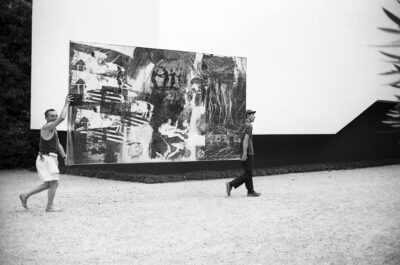The new documentary Taking Venice, which we open next week at the Royal in West L.A. and the Town Center in Encino, uncovers the true story behind rumors that the U.S. government and a team of high-placed insiders rigged the 1964 Venice Biennale – the Olympics of art – so their chosen artist, Robert Rauschenberg, could win the Grand Prize. Director Amei Wallach wrote this about her film:"I grew up during the Cold War when the world seemed as dangerous as it does today. But it also seemed to be filled with possibility, with the actions of people who dreamed big and took big chances. This was especially true of artists, always looking to build something new. I became an art critic, then an author, and now a filmmaker. My goal is to make films about art that leap out of the art world and into a reckoning with what’s relevant in our lives through the stories that they tell.[caption id="attachment_20111" align="aligncenter" width="400"] Recreation of the 1964 transport of Robert Rauschenberg’s work in Venice canals for exhibition at the Venice Biennale, as seen in TAKING VENICE, a film by Amei Wallach. A Zeitgeist Films release in association with Kino Lorber.[/caption]"This film tells the story of the 1964 Venice Biennale, at a time when State Department officials and a team of unlikely conspirators were joined in their conviction that American democracy was worth the fight. They were determined to harness the audacity of American art to promote what was best about democracy. The artist they chose to represent the U.S. in their race to win the Biennale Grand Prize was Robert Rauschenberg, who was by no means a political artist, then. By the time I met him more than a decade later, he had come to believe that art had a more global responsibility.[caption id="attachment_20112" align="aligncenter" width="400"]
Recreation of the 1964 transport of Robert Rauschenberg’s work in Venice canals for exhibition at the Venice Biennale, as seen in TAKING VENICE, a film by Amei Wallach. A Zeitgeist Films release in association with Kino Lorber.[/caption]"This film tells the story of the 1964 Venice Biennale, at a time when State Department officials and a team of unlikely conspirators were joined in their conviction that American democracy was worth the fight. They were determined to harness the audacity of American art to promote what was best about democracy. The artist they chose to represent the U.S. in their race to win the Biennale Grand Prize was Robert Rauschenberg, who was by no means a political artist, then. By the time I met him more than a decade later, he had come to believe that art had a more global responsibility.[caption id="attachment_20112" align="aligncenter" width="400"] Transporting Robert Rauschenberg’s Express at the XXXII International Biennale of Art Exhibition, Venice, 1964, as seen in TAKING VENICE, a film by Amei Wallach. A Zeitgeist Films release in association with Kino Lorber. Photo Ugo Mulas.[/caption]"The film builds on a tradition of telling the story of America then through the eyes of now because I want it to reflect how much the world and art have changed. I want there to be moments that sting with what we have lost, and moments that encapsulate what we have gained. The stakes are even higher than they were at that scandal-drenched Biennale, as artists everywhere try to create a way forward."
Transporting Robert Rauschenberg’s Express at the XXXII International Biennale of Art Exhibition, Venice, 1964, as seen in TAKING VENICE, a film by Amei Wallach. A Zeitgeist Films release in association with Kino Lorber. Photo Ugo Mulas.[/caption]"The film builds on a tradition of telling the story of America then through the eyes of now because I want it to reflect how much the world and art have changed. I want there to be moments that sting with what we have lost, and moments that encapsulate what we have gained. The stakes are even higher than they were at that scandal-drenched Biennale, as artists everywhere try to create a way forward."
 Recreation of the 1964 transport of Robert Rauschenberg’s work in Venice canals for exhibition at the Venice Biennale, as seen in TAKING VENICE, a film by Amei Wallach. A Zeitgeist Films release in association with Kino Lorber.[/caption]"This film tells the story of the 1964 Venice Biennale, at a time when State Department officials and a team of unlikely conspirators were joined in their conviction that American democracy was worth the fight. They were determined to harness the audacity of American art to promote what was best about democracy. The artist they chose to represent the U.S. in their race to win the Biennale Grand Prize was Robert Rauschenberg, who was by no means a political artist, then. By the time I met him more than a decade later, he had come to believe that art had a more global responsibility.[caption id="attachment_20112" align="aligncenter" width="400"]
Recreation of the 1964 transport of Robert Rauschenberg’s work in Venice canals for exhibition at the Venice Biennale, as seen in TAKING VENICE, a film by Amei Wallach. A Zeitgeist Films release in association with Kino Lorber.[/caption]"This film tells the story of the 1964 Venice Biennale, at a time when State Department officials and a team of unlikely conspirators were joined in their conviction that American democracy was worth the fight. They were determined to harness the audacity of American art to promote what was best about democracy. The artist they chose to represent the U.S. in their race to win the Biennale Grand Prize was Robert Rauschenberg, who was by no means a political artist, then. By the time I met him more than a decade later, he had come to believe that art had a more global responsibility.[caption id="attachment_20112" align="aligncenter" width="400"] Transporting Robert Rauschenberg’s Express at the XXXII International Biennale of Art Exhibition, Venice, 1964, as seen in TAKING VENICE, a film by Amei Wallach. A Zeitgeist Films release in association with Kino Lorber. Photo Ugo Mulas.[/caption]"The film builds on a tradition of telling the story of America then through the eyes of now because I want it to reflect how much the world and art have changed. I want there to be moments that sting with what we have lost, and moments that encapsulate what we have gained. The stakes are even higher than they were at that scandal-drenched Biennale, as artists everywhere try to create a way forward."
Transporting Robert Rauschenberg’s Express at the XXXII International Biennale of Art Exhibition, Venice, 1964, as seen in TAKING VENICE, a film by Amei Wallach. A Zeitgeist Films release in association with Kino Lorber. Photo Ugo Mulas.[/caption]"The film builds on a tradition of telling the story of America then through the eyes of now because I want it to reflect how much the world and art have changed. I want there to be moments that sting with what we have lost, and moments that encapsulate what we have gained. The stakes are even higher than they were at that scandal-drenched Biennale, as artists everywhere try to create a way forward."